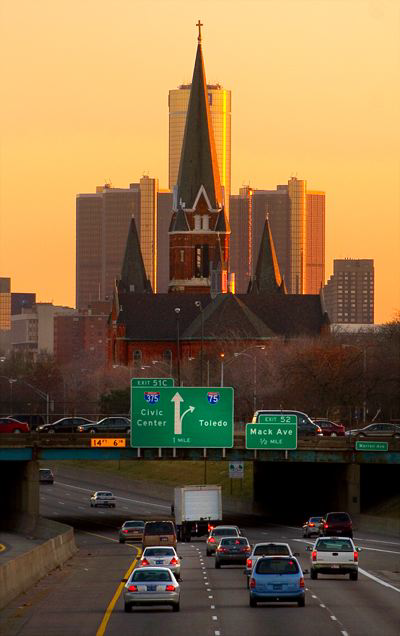No Light Rail in Vancouver!
Let’s Reduce Congestion by Tearing Out Freeways

Those wacky planners are always coming up with crazy ideas. Recently, a planner over at Planetizen proposed that cities should remove urban freeways.
His reasoning was simple. Freeways are ugly. Cars are evil. Freeways induce more driving. So if we get rid of the freeways, people will drive less and everyone will be happier.

Beauty vs. mobility?
Flickr photo by gsgeorge
I can’t argue with the notion that some freeways are ugly, but so are a lot of things and beauty, after all, is in the eye of the beholder. Everything else about this argument is simply wrong.
Let’s focus on the induced-
Cervero argues that the last type — people diverted from other roads — should not be considered induced because it is not adding any new driving in the region. From the numbers i have seen, at least half of the increased driving we see on new freeways falls into this category.
But beyond this, Cervero says the whole induced-
Transit advocates are quick to point out the advantages of, say, spending $16 billion on a new subway line in Manhattan because it will save some people from walking an extra couple of blocks. But they pour scorn on the idea that a freeway provides increased mobility when it leads to new traffic.
Instead of worrying about induced demand, says Cervero, “far more energies need to go toward studying how America can best invest and manage scarce urban transportation resources.”
Marcotico, one of the people commenting on the Planetizen article about removing urban freeways claims that “mass transit takes off when other options become unattractive.” He also adds, in response to another commenter who said that congestion is harming San Francisco’s economy, “I hardly think that San Francisco is suffering from economic problems.”
This is what makes urban planners so much fun. They take firm stands on issues without checking them out. Mass transit carries just 4 percent of passenger travel in the San Francisco Bay Area — is that how we define “takes off”? Meanwhile, the Bay Area has grown by just 0.1 percent per year since 2000. This slow growth reflects the departure of employers to other regions that are less regulated, less costly, and yes, less congested.
Instead of tearing out urban freeways, we need to talk about how we can best relieve the congestion that is stifling urban economies. If freeways are the best way to do it, we can then talk about what can be done to make those freeways a little more aesthetically pleasing.
But that won’t be enough for some planning advocates. Marcotico reveals the real agenda when he adds: “I hope [people who drive] will be more and more, forced to choose also to sit in traffic as trains and BART wizz by them.” Increasing congestion does not get significant people out of their cars, but it punishes them for driving. If planners experience schadenfreude from congestion, that is enough for some of them to justify removing urban freeways.
13
Trackback • Posted in Transportation
Reprinted from The Antiplanner